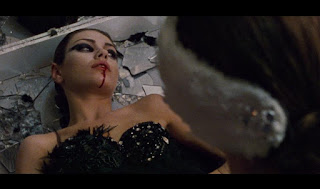Black Swan
feels like a one-up on the Fight Club
formula. The antagonist is in the head of the protagonist, but not
exclusively so. Lily (Mila Kunis) interacts with other characters,
and even comments on Nina's (Natalie Portman) delusions. While it's
not always clear what literally happened, the movie makes no attempt
to hide that it's about a mental breakdown, so this isn't a major
spoiler. The real Lily is even amused to find that Nina fantasized a
sexual encounter between them well before the end of the film.
Nina
is a ballerina pushed into the profession by her stage-parent mother
(Barbara Hershey), who gave up her own dancing career to raise Nina.
Her ballet troupe's headliner, Beth MacIntyre (Winona Ryder), is
aging and ready to retire, so a new lead is needed for the Swan Queen
in Swan Lake, who will
have to dance as both the innocent White Swan, and the seductive
Black Swan. Nina is cast primarily on the strength of her White Swan
performance, despite her inability to properly perform the Black
Swan.
At the same time
Lily enters the troupe, a far more sexual and experienced woman who
ends up promoted to Nina's understudy based on the strength of her
Black Swan. The two have great chemistry together, but it's not
clear how much of the relationship is real. They vary between
friendship and bitter rivalry, going out on the town for a night in
what seems to be Nina's first ever act of rebellion against her
overbearing mother.
Throughout the film
Nina finds herself under attack by a doppelganger representing her
repressed emotions. However, early in the film the doppelganger
exclusively appears with Nina's appearance, in later scenes she
begins to hallucinate it as Lily, creating the ambiguity about their
relationship. Lily is the free and independent person who Nina wants
to be, and Nina hallucinates the aforementioned sexual encounter
after their night out together.
The two other major
influences on Nina are her mother, and the director Thomas (Vincent
Cassel). Both of these figures follow the same basic arc: they push
Nina only to realize that they've gone too far. However, her mother
is a repressive force trying to keep Nina under her thumb, while
Thomas wants her to lose her innocence and her control so that she
can become the Black Swan.
Of these two
figures, I find her mother to be the most fascinating. While she's
initially played as purely malevolent, by the end I'm honestly not
sure how to feel about her. She begs her daughter to drop out of the
performance as her mental state deteriorates, but her motives are
questionable. Does she want to save her daughter, or hold her back
from greatness? And how much of her cruelty and control was in
Nina's head all along?
Thomas walks the
line between a demanding employer, and a sexual predator. The
sexuality is so fundamental to the role of the Black Swan that it's
hard to argue that a director kissing his actress passionately, or
telling her to masturbate, wouldn't have a positive impact on the
performance. On the flip side, he is pursuing a woman with an
obvious power imbalance.
Before
the final performance, Nina stabs her doppelganger, believing it to
be the real Lily, when the doppelganger tries to overtake her as the
Black Swan. With this act, Nina's hallucinations seem to accelerate,
and she imagines herself growing wings on stage as she nails the
Black Swan. Seeing Lily, she realizes before the final act that she
had stabbed herself, but danced on anyway, declaring her performance
to be “perfect” to Thomas in the final line of the film.
The movie manages
to avoid one of the biggest missteps of most modern horror: the movie
doesn't drive-home it's status as horror. The horror comes from the
things that happen. There's never a scene in which the audience is
asked to despair. The movie is filled with tension and uncertainty,
right up to the final shot. It takes a talented director to make you
legitimately uncertain if you should should be happy or sad. Did
Nina kill herself in her performance? Or did she finally grow to
maturity, while suffering a flesh-wound?
I find
this movie fascinating because it's a horror movie that clearly has
women as it's main audience. Don't get me wrong, female stories have
always been a big part of the horror genre, but anyone can be scared
of Ginger in Ginger Snaps
becoming a big, slobbering monster. This is a movie that makes the
idea of maturing into a world that demands nothing short of physical
perfection absolutely frightening. It's a movie about the terror of
the female experience, that I honestly don't feel fully qualified to
address.
That said, however,
this film is great. It kept me enthralled beginning to end. What
I've seen of Aronofsky's other work has been, for the most part,
either too depressing or too boring for my tastes, but this film hit
it out of the park. It's a masterpiece, beginning to end.

No comments:
Post a Comment